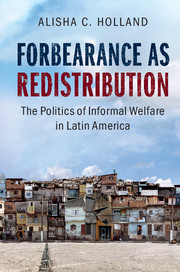
-
Select format
-
- Publisher:
- Cambridge University Press
- Publication date:
- 30 August 2017
- 16 June 2017
- ISBN:
- 9781316795613
- 9781107174078
- 9781316626351
- Dimensions:
- (228 x 152 mm)
- Weight & Pages:
- 0.66kg, 400 Pages
- Dimensions:
- (228 x 152 mm)
- Weight & Pages:
- 0.57kg, 398 Pages
You may already have access via personal or institutional login
Book description
Why do governments tolerate the violation of their own laws and regulations? Conventional wisdom is that governments cannot enforce their laws. Forbearance as Redistribution challenges the standard interpretation by showing that politicians choose not to enforce laws to distribute resources and win elections. Alisha Holland demonstrates that this forbearance towards activities such as squatting and street vending is a powerful strategy for attracting the electoral support of poor voters. In many developing countries, state social programs are small or poorly targeted and thus do not offer politicians an effective means to mobilize the poor. In contrast, forbearance constitutes an informal welfare policy around which Holland argues much of urban politics turns. While forbearance offers social support to those failed by their governments, it also perpetuates the same exclusionary welfare policies from which it grows.
Awards
Co-Winner, 2018 Herbert Jacob Book Prize, Law and Society Association
Winner, 2018 Giovanni Sartori Book Award, Qualitative and Multi-Method Research, American Political Science Association
Winner, 2017-2018 Best Book Award, The Section of Political Institutions and Processes at the Latin American Studies Association
Honorable Mention, 2019 ECPR Stein Rokkan Prize for Comparative Social Science Research, European Consortium for Political Research
Reviews
'This book is a gem and makes a crucial contribution to our understanding of distributive politics. Holland’s discussion of the distributive implications of variation in forbearance for poor and rich citizens is brilliant.'
Maria Victoria Murillo - School of International and Public Affairs, Columbia University
'When do governments choose to exercise forbearance and tolerate violations of the law? This question is at the heart of this painstakingly well-executed investigation of government responses to squatting and street vending in three Latin American cities. This book is an instant classic.'
Hillel Soifer - Temple University, Philadelphia
'When we think of law being selectively applied in Latin America, our minds call up accounts of the wealthy and the powerful getting away with murder. This meticulously executed book turns the tables, showing how the state sometimes withholds enforcement to achieve redistributive ends. This is the most interesting twist on the politics of social provision and the rule of law to come along in many years.'
Daniel M. Brinks - University of Texas, Austin
'This is one of those rare books that changes forever the way you think about an issue, in this case the endemic and enduring informality found across the developing world.'
Ben Ross Schneider - Massachusetts Institute of Technology
‘I found the book to be a very important contribution to the literature in the Global South on welfare provision, urban governance and electoral theory since it sheds light on the bi-directional complex relationship between the state and society, using housing and employment as a lens to study the political structures of cities.’
Irene Farah Source: Urban Studies
Contents
Metrics
Altmetric attention score
Full text views
Full text views help Loading metrics...
Loading metrics...
* Views captured on Cambridge Core between #date#. This data will be updated every 24 hours.
Usage data cannot currently be displayed.
Accessibility standard: Unknown
Why this information is here
This section outlines the accessibility features of this content - including support for screen readers, full keyboard navigation and high-contrast display options. This may not be relevant for you.
Accessibility Information
Accessibility compliance for the PDF of this book is currently unknown and may be updated in the future.


